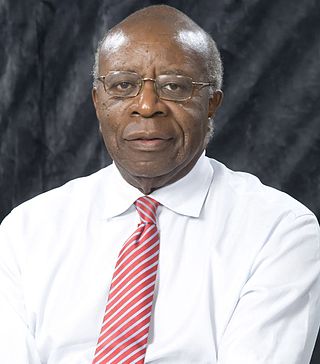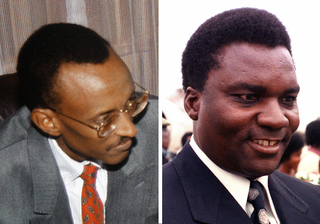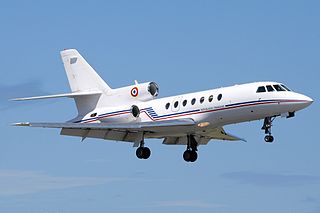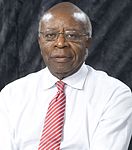Human occupation of Rwanda is thought to have begun shortly after the last ice age. By the 11th century, the inhabitants had organized into a number of kingdoms. In the 19th century, Mwami (king) Rwabugiri of the Kingdom of Rwanda conducted a decades-long process of military conquest and administrative consolidation that resulted in the kingdom coming to control most of what is now Rwanda. The colonial powers, Germany and Belgium, allied with the Rwandan court.

Juvénal Habyarimana was a Rwandan politician and military officer who was the second president of Rwanda, from 1973 until his assassination in 1994. He was nicknamed Kinani, a Kinyarwanda word meaning "invincible".

Paul Kagame is a Rwandan politician and former military officer who has been the President of Rwanda since 2000. He was previously a commander of the Rwandan Patriotic Front (RPF), a rebel armed force which invaded Rwanda in 1990. The RPF was one of the parties of the conflict during the Rwandan Civil War and the armed force which ended the Rwandan genocide. He was considered Rwanda's de facto leader when he was Vice President and Minister of Defence under President Pasteur Bizimungu from 1994 to 2000 after which the vice-presidential post was abolished.

The Rwandan Patriotic Front is the ruling political party in Rwanda.
The Republican Democratic Movement was a political party in Rwanda.

The Rwandan genocide, also known as the genocide against the Tutsi, occurred between 7 April and 19 July 1994 during the Rwandan Civil War. During this period of around 100 days, members of the Tutsi minority ethnic group, as well as some moderate Hutu and Twa, were killed by armed Hutu militias. Although the Constitution of Rwanda states that more than 1 million people perished in the genocide, the demographic evidence suggests that the real number killed was likely lower. The most widely accepted scholarly estimates are around 500,000 to 662,000 Tutsi deaths.

Faustin Twagiramungu was a Rwandan politician. He was Prime Minister of Rwanda from 1994 until his resignation in 1995, the first head of government appointed after the Rwandan Patriotic Front (RPF) captured Kigali. He soon came to disagree with the RPF's policies and actions, resigned and was placed under house arrest, but managed to leave the country and settle in Belgium. He continued his opposition activity against Paul Kagame's rule, subsequently returning to Rwanda and standing for elections, but without success.
Agathe Uwilingiyimana, sometimes known as Madame Agathe, was a Rwandan political figure. She served as Prime Minister of Rwanda from 18 July 1993 until her assassination on 7 April 1994, during the opening stages of the Rwandan genocide. She was also Rwanda's acting head of state in the hours leading up to her death.

Pasteur Bizimungu is a Rwandan politician who served as the third President of Rwanda, holding office from 19 July 1994 until 23 March 2000.

Elections in Rwanda are manipulated in various ways, which include banning opposition parties, arresting or assassinating critics, and electoral fraud. According to its constitution, Rwanda is a multi-party democracy with a presidential system. In practice, it functions as a one-party state ruled by the Rwandan Patriotic Front and its leader Paul Kagame. The President and majority of members of the Chamber of Deputies are directly elected, whilst the Senate is indirectly elected and partly appointed.

The Rwandan Civil War was a large-scale civil war in Rwanda which was fought between the Rwandan Armed Forces, representing the country's government, and the rebel Rwandan Patriotic Front (RPF) from 1 October 1990 to 18 July 1994. The war arose from the long-running dispute between the Hutu and Tutsi groups within the Rwandan population. A 1959–1962 revolution had replaced the Tutsi monarchy with a Hutu-led republic, forcing more than 336,000 Tutsi to seek refuge in neighbouring countries. A group of these refugees in Uganda founded the RPF which, under the leadership of Fred Rwigyema and Paul Kagame, became a battle-ready army by the late 1980s.

On the evening of 6 April 1994, the aircraft carrying Rwandan president Juvénal Habyarimana and Burundian president Cyprien Ntaryamira, both Hutu, was shot down with surface-to-air missiles as their jet prepared to land in Kigali, Rwanda; both were killed. The assassination set in motion the Rwandan genocide, one of the bloodiest events of the late 20th century.

Human rights in Rwanda have been violated on a grand scale. The greatest violation is the Rwandan genocide of Tutsi in 1994. The post-genocide government is also responsible for grave violations of human rights.
Seth Sendashonga was the Minister of the Interior in the government of national unity in Rwanda, following the military victory of the Rwandan Patriotic Front (RPF) after the 1994 genocide. One of the politically moderate Hutus in the National Unity Cabinet, he became increasingly disenchanted with the RPF and was eventually forced from office in 1995 after criticizing government policies. After surviving a 1996 assassination attempt while in exile in Kenya, he launched a new opposition movement, the Forces de Résistance pour la Démocratie (FRD). Sendashonga was killed by unidentified gunmen in May 1998. The Rwandan government is widely believed to be responsible for the assassination.

Presidential elections were held in Rwanda on 9 August 2010, the second since the Rwandan Civil War. Incumbent President Paul Kagame of the Rwandan Patriotic Front (RPF) was re-elected for a second seven-year term with 93% of the vote.
Rwandan genocide denial is the pseudohistorical assertion that the Rwandan genocide did not occur, specifically rejection of the scholarly consensus that Rwandan Tutsis were the victims of genocide between 7 April and 19 July 1994. The perpetrators, a small minority of other Hutu, and a fringe of Western writers dispute that reality.

Colonel Alexis Kanyarengwe (1938–2006) was a Rwandan officer who fled Rwanda in 1980 amidst accusations that he was plotting against Juvénal Habyarimana.
Laurien Ntezimana is a Rwandan Catholic theologian, sociologist and peace activist known for protecting Tutsi during the Rwandan genocide of 1994.
Since the end of the Rwandan Civil War, many forms of censorship have been implemented in Rwanda.

In Praise of Blood: The Crimes of the Rwandan Patriotic Front is a 2018 non-fiction book by Canadian journalist Judi Rever and published by Random House of Canada; it has also been translated into Dutch and French. The book describes alleged war crimes by the Rwandan Patriotic Front (RPF), Rwanda's ruling political party, during its ascent to power in the 1990s.














